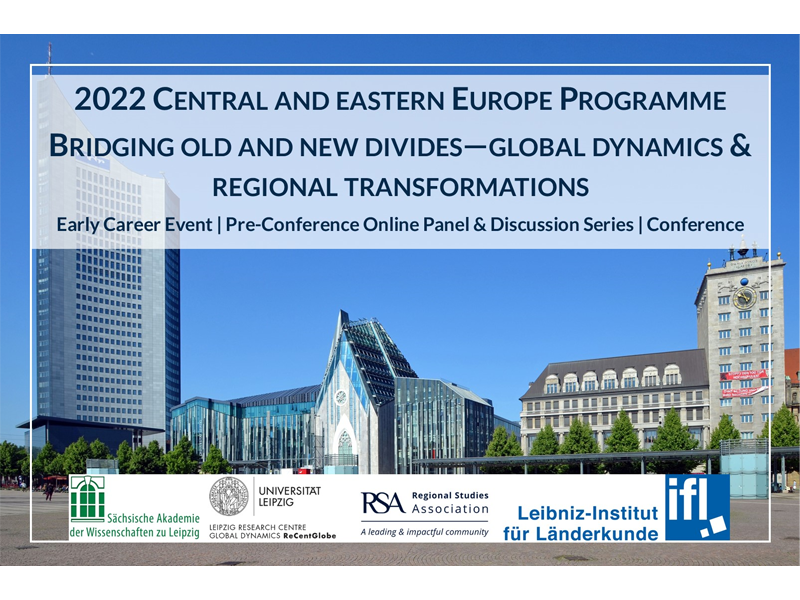The last panel of the free Online panel & discussion series, dedicated on CEE Societies and cultures, will take place On 7th June, 16:30-18:00 CET. The panelists Stefan Popov, Karolina Wigura, and Špela Drnovšek Zorko will discuss about the connections between Central Europe, Brexit and Covid-19. The panel is part of the RSA CEE pre-conference programme and will be hosted and moderated by Lyubomir Pozharliev.
There have been several major disruptions in the European Union and the whole Central and Eastern Europe (CEE) in the last couple of years, creating fears, new and old divides. Already for 10 years, Core Europe experiences problems in convincing Hungary and Poland in respecting the rules of law and respect democracy. After 3 years of suffering on January 2020 Brexit became a fact, which raised fears within the migrants and families in the UK, as well as in continental Europe for the future of the EU project. A little bit after in early 2020 the Covid-19 pandemic hit the whole world and raised voices of solidarity as well as political and societal disrupts in CEE and elsewhere. Bringing these topics together, this panel aims to elaborate on the chances as well as on the menaces and challenges in front of CEE. Are there new or old paths of solidarity possible? Is there a “third way” for Europe and CEE?
You can register here for free to join the panel online, no membership required.
About the Speakers
Stefan Popov (New Bulgarian University, Sofia)

Stefan Popov holds a Ph.D. in Philosophy and Social Science from the New School for Social Research, New York (1996) and D.Sc. in Philosophy from Sofia University (2015). He has specialized in constitutional policy (Vienna, 1994, and Freiburg, 2003), international security (Washington, 1999) and public policy (Vienna, 2011-2012). Additional to his position as executive Director at the non-profit, non-governmental public policy institute RiskMonitor he is of Political Philosophy at the New Bulgarian University, Sofia. In the last decades he has authored several books, among them Wittgenstein’s Analytic of the Mystical (Altera, 2008), Obiectum Purum: Introduction to Rene Descartes’s Phenomenology (Literaturen Vestnik, 2015), Public Process, Vol. I and II (Ciela, 2015), Atlantis: Disintegration of Political Bodies (Obsidian, 2016), Descartes and the Mathematization of the World (Altera, 2017), The Life of Empty Phrases. Critique of Policy Metaphors (NBU, 2020), Risk. A Conceptual Framework (NBU, 2022), and a sports book, Modern Ski Technique (NBU, 2019).
Karolina Wigura (Kultura Liberalna, Poland and University of Warsaw, Poland)

Karolina Wigura is a historian, sociologist and political editor of Kultura Liberalna, Poland’s leading online political and cultural weekly. She is lecturer at Warsaw University’s Institute of Sociology and focuses on the political philosophy of the 20th century and emotions in politics, as well as sociology and ethics of memory, particularly transitional justice, historical guilt, and reconciliation. From 2016 to 2018, she was a co-director of the Polish Programme in St. Antony’s College at University of Oxford. Wigura is currently a Richard von Weizsaecker Fellow at the Robert Bosch Academy in Berlin. “She is the author of The Guilt of Nations: Forgiveness as a Political Strategy (2011) and The Invention of Modern Heart: Philosophical Sources of Contemporary Thinking of Emotions (2019) – both in Polish. Her work has also been published in The Guardian, The New York Times, Neue Zuercher Zeitung, Gazeta Wyborcza, and other periodicals. Wigura studied sociology, philosophy, and political science at University of Warsaw and University of Munich. She received her doctorate and habilitation from University of Warsaw.
Špela Drnovšek Zorko (The University of Warwick, UK)

Špela Drnovšek Zorko is a social anthropologist working at the intersections of migration, memory, and global race studies. After obtaining her PhD at SOAS University of London in 2017, she held a Leverhulme Trust Early Career Fellowship in the Department of Sociology, University of Warwick and was an Associate Fellow at the Warwick Institute of Advanced Study. She is a member of the Dialoguing Posts network and the NODE UK-Japan network, and her research on intergenerational post-Yugoslav narratives and postsocialist migrants’ articulations of race and geopolitical coevalness has appeared in journals including Ethnic and Racial Studies, Comparative Migration Studies, and The Sociological Review. She is a current recipient of the JSPS Postdoctoral Fellowship for Research in Japan.

This panel is part of the RSA CEE pre-conference programme. These online webinars will be organised jointly with the scientific committee, local team, and the scientific board of the conference. More information can be found on the RSA website.
